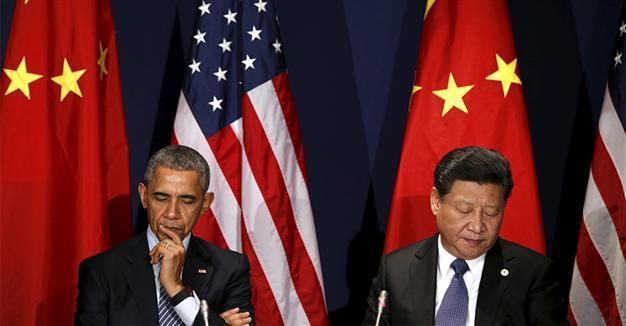Global climate talks stumbling near finish line, as Obama, Xi talk
PARIS

U.S. President Barack Obama meets with Chinese President Xi Jinping at the start of the two-week climate summit in Paris November 30, 2015. REUTERS/Kevin Lamarque
Efforts to craft a global accord to combat climate change stumbled early on Dec. 11 after a “hard night” of talks, forcing host nation France to extend the U.N. summit by a day to overcome stubborn divisions.After revealing a new draft treaty that removed some main points of contention late Dec. 10, French Foreign Minister Laurent Fabius said a final text would now be presented to nearly 200 nations for review only on Dec. 12, not later on Dec. 11 as he had hoped just hours earlier, Reuters reported.
“I will not present the text Friday evening, as I had thought, but Saturday morning,” Fabius said on BFM television. “There is still work to do ... Things are going in the right direction,” the Associated Press quoted him as saying.
“Following the consultations I will have, I will be in a position tomorrow morning at 9 a.m. to present to all parties a text, which, I am sure, will be approved and will be a big step forward for humanity as a whole,” Fabius told reporters later in the day. “We are almost at the end of the road and I am optimistic.”
Secretary General Ban Ki-moon called on Dec. 11 on envoys from around the world to take a “final decision for humanity.”
“This negotiation is most complicated, most difficult, but most important for humanity. We have just very limited hours remaining,” Ban told reporters as ministers grabbled with stubborn differences over pivotal issues.
As at the outset two weeks ago, some nations remain at odds over issues such as how to balance actions by rich and poor to limit greenhouse gases, and also the long-term goals of any agreement to limit emissions that are warming the earth.
One source said the “night was very hard.”
“Major countries have entrenched behind their red lines instead of advancing on compromise,” said Matthieu Orphelin, spokesman for the Nicolas Hulot Foundation.
Fabius, speaking on French BFMTV, kept a positive tone.
“But the atmosphere is good, things are positive, things are going in the right direction,” he said.
US-China leaders talk on phone over climate
Separately, Chinese President Xi Jinping and his U.S. counterpart Barack Obama discussed the Paris climate summit in a phone call on Dec. 11, Beijing’s foreign ministry said, according to Agene France-Presse.
Without giving direct quotes, a statement on its website cited Xi as saying that China and the U.S. “must strengthen coordination with all parties” and “make joint efforts to ensure the Paris climate summit reaches an accord as scheduled.”
A deal would be beneficial to the international community, it cited him as adding.
The ministry cited Obama as replying that the U.S. was willing to maintain coordination with China, again without giving direct quotes.
They have put up the fiercest resistance against attempts by the U.S., the European Union and other wealthy nations to make emerging economies pitch in to reduce global greenhouse gas emissions and help the poorest countries cope with climate change. The issue, known as “differentiation” in United Nations climate lingo, was expected to be one of the last to be resolved.
“We’re working on it,” Kerry said as he emerged from one meeting room with an entourage of security agents and State Department aides.
The latest draft pointed to a compromise on the once-formidable divide over how ambitious the deal should be in trying to control the rise in the earth’s surface temperature. It indicated apparent agreement on seeking a more ambitious goal to restrain the rise in temperatures to less than 2 degrees Celsius above pre-industrial levels.
The White House said both leaders agreed the negotiations presented a “crucial opportunity to galvanize global efforts to meet the climate change challenge.”
















